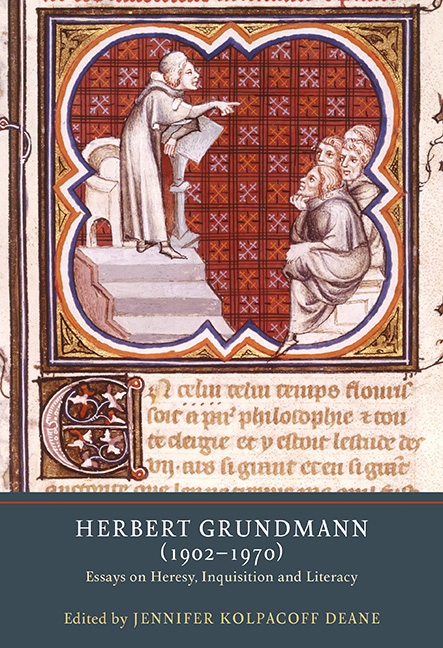Book contents
- Frontmatter
- Contents
- Acknowledgements
- Abbreviations
- Introduction
- Note on the Text
- 1 The Profile (Typus) of the Heretic in Medieval Perception
- 2 Women and Literature in the Middle Ages: A Contribution on the Origins of Vernacular Writing
- 3 Litteratus–Illitteratus: The Transformation of an Educational Standard from Antiquity to the Middle Ages
- 4 Heresy Interrogations in the Late Middle Ages as a Source-Critical Problem
- 5 Oportet et Haereses Esse: The Problem of Heresy in the Mirror of Medieval Biblical Exegesis
- 6 Learned and Popular Heresies of the Middle Ages
- 7 Obituary Essay (1970) by Arno Borst [annotations by Dr Letha Böhringer]
- 8 Bibliography of Herbert Grundmann
- Index
- YORK MEDIEVAL PRESS: PUBLICATIONS
5 - Oportet et Haereses Esse: The Problem of Heresy in the Mirror of Medieval Biblical Exegesis
Published online by Cambridge University Press: 19 March 2020
- Frontmatter
- Contents
- Acknowledgements
- Abbreviations
- Introduction
- Note on the Text
- 1 The Profile (Typus) of the Heretic in Medieval Perception
- 2 Women and Literature in the Middle Ages: A Contribution on the Origins of Vernacular Writing
- 3 Litteratus–Illitteratus: The Transformation of an Educational Standard from Antiquity to the Middle Ages
- 4 Heresy Interrogations in the Late Middle Ages as a Source-Critical Problem
- 5 Oportet et Haereses Esse: The Problem of Heresy in the Mirror of Medieval Biblical Exegesis
- 6 Learned and Popular Heresies of the Middle Ages
- 7 Obituary Essay (1970) by Arno Borst [annotations by Dr Letha Böhringer]
- 8 Bibliography of Herbert Grundmann
- Index
- YORK MEDIEVAL PRESS: PUBLICATIONS
Summary
The assertion that heresy must exist, that it has to be present, might sound to many theologians today all too ‘modern’, as suspiciously conciliatory or resigned, a fatal capitulation to the unfortunate ‘pluralism’ of opinions. Or it might have seemed so, had not the Apostle Paul written exactly that in his first letter to the Corinthians, chapter 11, verse 19. Paul had heard complaints from all directions on problems and disputes in the young Hellenistic Christian congregation of Corinth, where he himself had worked for a year and a half on his second missionary journey. Some years later he learned that differences of opinion had split that congregation, even concerning the common celebration of the Last Supper. ‘I have heard’, the Apostle writes from Ephesus (probably in the year 54 or 57), among other recommendations, ‘that there are divisions among you, and I believe it at least in part; for there must certainly be (parties) (among you), so that the just, the reliable, the tested will be openly with you.’ In the Latin Vulgate text it is: ‘Audio scissuras esse inter vos, et ex parte credo, nam oportet et haereses esse, ut et qui probati sunt, manifesti fiant in vobis.’ Luther translated: ‘Ich höre, es seien Spaltungen unter euch, und zum Teil glaube ich’s. Denn es müssen Rotten unter euch sein, auf daß die, so rechtschaffen sind, offenbar unter euch werden.’ In Galatians 5.20 Luther translates the word with Rotten, listing those who were involved in a long series of damnable works of the flesh from adultery and whoring to murder, drunkenness, overeating and the like, along with disturbance, conflict and hatred; in the Vulgate the word at this point is sectae. Similarly, as the word Rotten in the sense of a ‘gang’ is unknown in our language since Luther's time (and causes one to think of the rebellious Rotte Korah in Numbers chapter 19), the newer edition of the German Bible has replaced it [in 1 Corinthians] (though not in Galatians) with Parteien (‘parties’), so that it now reads: ‘there must be parties among you’. The phrase almost sounds contemporary, until one remembers that this translates the word – haereses. But surely Luther chose that word on purpose rather than translating it as Ketzerei, as it had usually been understood – or perhaps misunderstood – until then.
- Type
- Chapter
- Information
- Herbert Grundmann (1902–1970)Essays on Heresy, Inquisition, and Literacy, pp. 180 - 215Publisher: Boydell & BrewerPrint publication year: 2019



